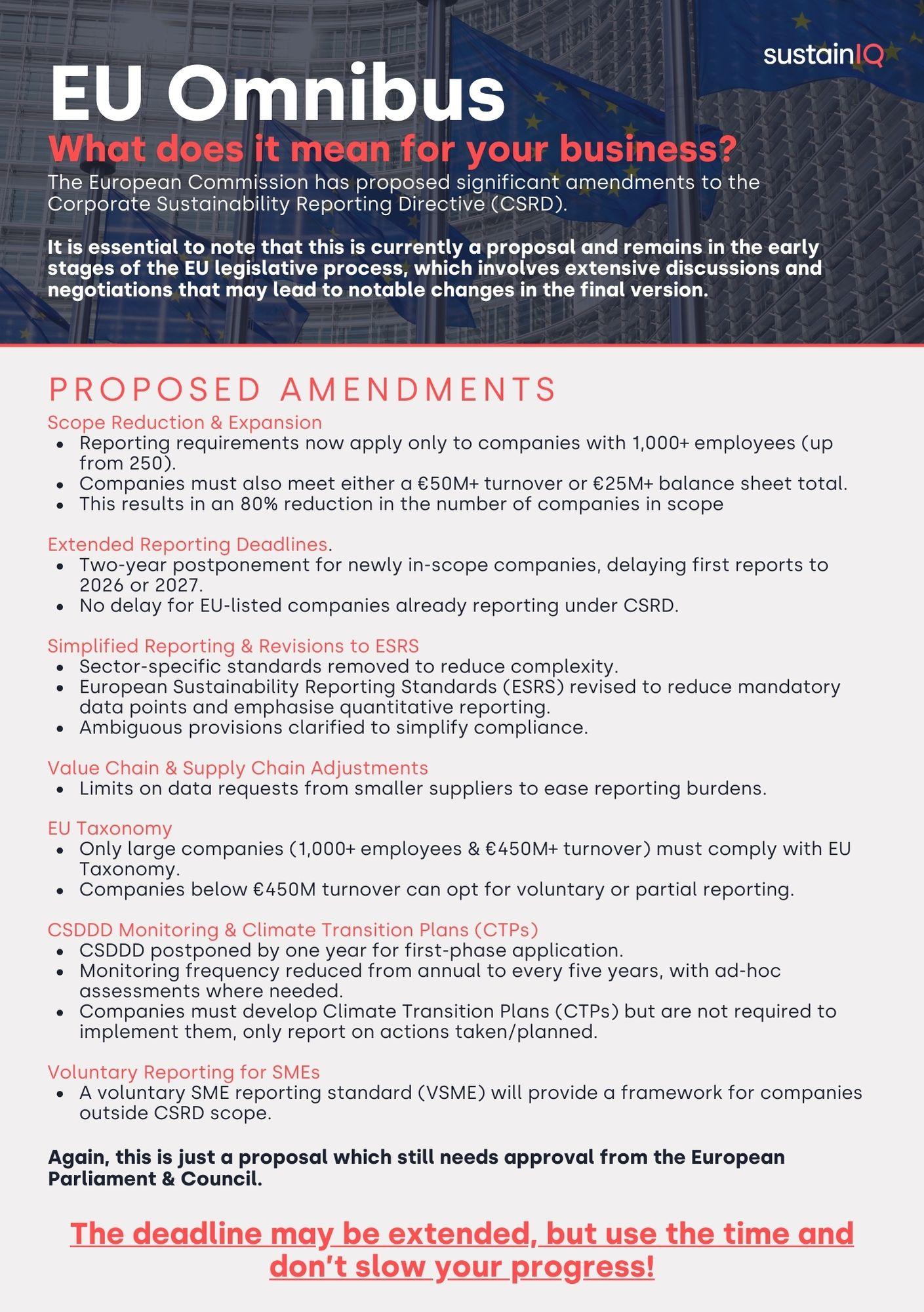Feb 28, 2025 | RACHAEL ANDREW
EU Omnibus Package: Important Changes to CSRD You Need to Know
The European Commission has recently proposed significant amendments to the Corporate Sustainability Reporting Directive (CSRD) through what's being called the "EU Omnibus." These proposed changes could substantially impact how businesses approach the CSRD
What is the CSRD?
The Corporate Sustainability Reporting Directive (CSRD) represents the EU's landmark legislation requiring companies to report on their environmental and social impacts. It was designed to increase corporate transparency, improve the quality and comparability of sustainability information, and help drive the transition to a sustainable economy.
Download our CSRD ebook for a more detailed resource outlining everything you need to know.
Key Proposed Changes in the Omnibus Package
As highlighted in the recent EU Commission proposal, several important amendments are being considered:
Scope Reduction & Expansion
- Reporting requirements would now apply only to companies with 1,000+ employees (up from 250)
- Companies must meet either a €50M+ turnover or €25M+ balance sheet total
- This results in an 80% reduction in the number of companies in scope
Extended Reporting Deadlines
- A two-year postponement for newly in-scope companies, delaying first reports to 2026 or 2027
- No delay for EU-listed companies already reporting under CSRD
Simplified Reporting & Revisions to ESRs
- Sector-specific standards removed to reduce complexity
- European Sustainability Reporting Standards (ESRs) revised to reduce mandatory data points and emphasise quantitative reporting
- Ambiguous provisions clarified to simplify compliance
Value Chain & Supply Chain Adjustments
- Limits on data requests from smaller suppliers to ease reporting burdens
EU Taxonomy
- Only large companies (1,000+ employees & €50M+ turnover) must comply with EU Taxonomy
- Companies below €45M turnover can opt for voluntary or partial reporting
CSDD Monitoring & Climate Transition Plans (CTPs)
- Corporate Sustainability Due Diligence (CSDD) postponed by one year for first-phase application
- Monitoring frequency reduced from annually to every five years, with ad-hoc assessments where needed
- Companies must develop Climate Transition Plans (CTPs) but are not required to implement them, only report on actions taken/planned
Voluntary Reporting for SMEs
- A voluntary SME reporting standard (VSME) will provide a framework for companies outside CSRD scope
You can download the full EU Omnibus documents here. Below is a document outlining the main proposed changes to be aware of:

What Happens Now?
It's important to understand that these changes are still in the proposal stage. The amendments need approval from both the European Parliament and Council before becoming final. This legislative process involves extensive discussions and negotiations that may result in further changes to the proposal.
We will continue to update our website and socials with any more information.
Don't Slow Down Your CSRD Progress
While the proposed amendments suggest potential relief through extended deadlines and simplified requirements, you should not use this as an excuse to delay your businesses sustainability reporting efforts.
The deadline may be extended, but use the time and don't slow your progress!
Use this potential extra time wisely and to your advantage:
- Building proper systems takes time: Developing robust data collection systems, establishing reporting processes, and training staff require significant time investment.
- Early adoption creates competitive advantage: Companies that embrace sustainability reporting ahead of requirements often gain market advantages and investor confidence.
- Regulatory uncertainty: Final approval may include different provisions than what's currently proposed, so being prepared for various scenarios is crucial.
- Stakeholder expectations: Regardless of regulatory timelines, stakeholders increasingly expect transparency around sustainability issues.
Use any additional time wisely to:
- Conduct thorough materiality assessments
- Improve data collection systems
- Train key personnel on sustainability reporting
- Engage with stakeholders to understand their priorities
- Benchmark against industry peers
Be prepared for further updates as the proposal moves through the legislative process, and remember that regardless of regulatory timelines, ESG is and is becoming more and more important for business success.
Need help with ESG data?
At SustainIQ, we are committed to helping our customers get full visibility of their sustainability performance by providing them with access to accurate and reliable ESG data in real time. We continue to watch as our customers embed sustainability into their strategies, position themselves as market leaders, build trust with their stakeholders, reduce risk of non-compliance, all while saving time and money.
To find out more information or arrange a demo of SustainIQ, email [email protected]
The deadline may be extended, but use the time and don't slow your progress!
